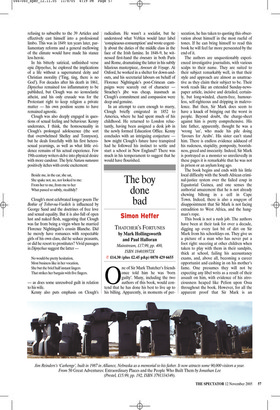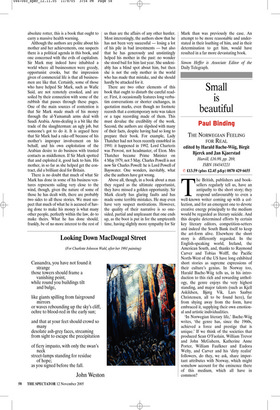The boy done bad
Simon Heffer
THATCHER’S FORTUNES by Mark Hollingsworth and Paul Halloran Mainstream, £17.99, pp. 400, ISBN 184018972X ✆ £14.30 (plus £2.45 p&p) 0870 429 6655 One of Sir Mark Thatcher’s friends once told him he was ‘born guilty’. Many, including the two authors of this book, would contend that he has done his best to live up to his billing. Apparently, in moments of per secution, he has taken to quoting this observation about himself in the most rueful of tones. If he can bring himself to read this book he will feel far more persecuted by the end of it.
The authors are unquestionably experienced investigative journalists, with various scalps to their name. They are suited to their subject remarkably well, in that their style and approach are almost as unattractive as they claim their subject to be. Their work reads like an extended Sunday-newspaper article, incisive and detailed, certainly, but long-winded, charm-free, humourless, self-righteous and dripping in malevolence. But then, Sir Mark does seem to have a knack of bringing out the worst in people. Beyond doubt, the charge-sheet against him is pretty comprehensive. His late father, apparently, thought he was a ‘wrong ’un’, who made his pile doing ‘favours for Arabs’. His sister can’t stand him. There is endless evidence adduced of his rudeness, stupidity, pomposity, boorishness, greed and insecurity. Indeed, Sir Mark is portrayed as a monster so unrelievedly in these pages it is remarkable that he was not in prison or an asylum long ago.
The book begins and ends with his little local difficulty with the South African criminal-justice system over the failed coup in Equatorial Guinea, and one senses the authorial amazement that he is not already chewing biltong in a cell in Cape Town. Indeed, there is also a soupçon of disappointment that Sir Mark is not facing extradition to West Africa, and the hangman’s rope.
This book is not a rush job. The authors have been at their task for over a decade, digging up every last bit of dirt on Sir Mark from his schooldays on. They give us a picture of a man who has never put a foot right: sneering at other children when taken to play with them in their sandpits, thick at school, failing his accountancy exams, and, above all, becoming a career opportunist and cashing in on his mother’s fame. One presumes they will not be expecting any libel writs as a result of their assault on him, with evidence of his atrociousness heaped like Pelion upon Ossa throughout the book. However, for all the apparent proof that Sir Mark is an absolute rotter, this is a book that ought to carry a massive health warning.
Although the authors are polite about his mother and her achievements, one suspects there is a political agenda in this book, and one concerned with the evils of capitalism. Sir Mark may indeed have inhabited a world where all businessmen were greedy, opportunist crooks, but the impression given of commercial life is that all businessmen are like that. Certainly, some of those who have helped Sir Mark, such as Wafic Said, are not remotely crooked, and are soiled by their connection with some of the rubbish that passes through these pages. One of the main sources of contention is that Sir Mark made much of his money through the al-Yamamah arms deal with Saudi Arabia. Arms-dealing is a bit like the trade of the slaughterman: an ugly job, but someone’s got to do it. It is argued here that Sir Mark had a rake-off because of his mother’s improper involvement on his behalf, and his own exploitation of the Arabian desire to do business with trusted contacts as middlemen. If Sir Mark spotted that and exploited it, good luck to him. His mother, in so far as she helped get the contract, did a brilliant deal for Britain.
There is no doubt that much of what Sir Mark has done in some of his business ventures represents sailing very close to the wind, though, given the nature of some of those he has dealt with, there are probably two sides to all these stories. We must suspect that much of what he is accused of having done to make his money is what many other people, perfectly within the law, do to make theirs. What he has done should, frankly, be of no more interest to the rest of us than are the affairs of any other hustler. Most interestingly, the authors show that he has not been very successful — losing a lot of his pile in bad investments — but also that he has generously and unstintingly helped his mother in the past: no wonder she stood bail for him last year. She undeniably has a blind spot about him, but then she is not the only mother in the world who has made that mistake, and she should hardly be attacked for it.
There are two other elements of this book that ought to disturb the careful reader. First, it occasionally features long verbatim conversations or shorter exchanges, in quotation marks, even though no footnote records that a contemporary note was taken or a tape recording made of them. This must devalue the credibility of the work. Second, the authors are slipshod with many of their facts, despite having had so long to prepare their book. For example, Lady Thatcher had not been recently ennobled in 1991: it happened in 1992. Lord Charteris was Provost, not headmaster, of Eton. Mrs Thatcher became Prime Minister on 4 May 1979, not 5 May. Charles Powell is not now Sir Charles Powell: he is Lord Powell of Bayswater. One wonders, inevitably, what else the authors have got wrong.
Above all, though, in a book about a man they regard as the ultimate opportunist, they have missed a golden opportunity. Sir Mark clearly has glaring faults and has made some terrible mistakes. He may even have very suspect motivations. However, the quality of their narrative is so onesided, partial and unpleasant that one ends up, as the boot is put in for the umpteenth time, having slightly more sympathy for Sir Mark than was previously the case. An attempt to be more reasonable and understated in their loathing of him, and in their determination to get him, would have resulted in a far more devastating book.




























































 Previous page
Previous page